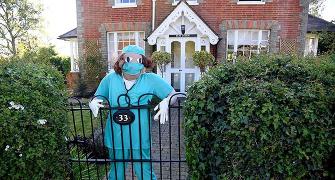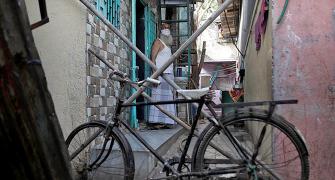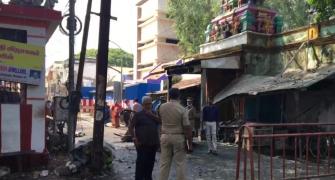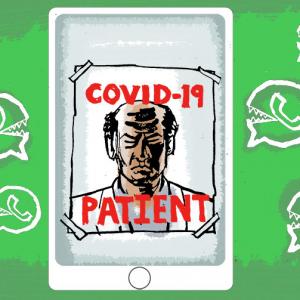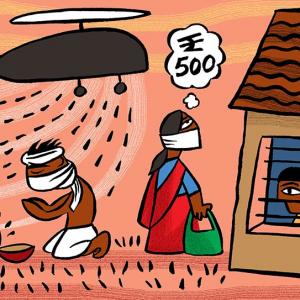The prayer, Sarvejana Sukhinobhavantu, or let the whole universe of living beings be well, helps.
So do profound and relevant Ancient Wise Words and aphorisms: Vasudaiva Kutumbakam, or the whole world is one big family, interconnected, interdependent.
And a sense of humour, jokes, pranks, writing, conversations.
And, last but definitely not least, the rippling waves of inner realisation on the background mind-track -- about the insignificance of ego, the importance of humility, the wasted opportunities in life, the wrong moves, the strokes of luck, the past 'sins', the what-ifs.

People of Indian Origin and NRIs describe the impact coronavirus is having on their lives.
Siva, Beijing, China
Working and living in Beijing meant/means that you have/had to be on guard all the time since the outbreak began, check advisories, local authorities's guidance on dos and don'ts.
Until the outbreak turned serious in the last week of January, I generally didn't wear a mask, even when air pollution reaches the worst possible levels. But this time, it was different. I had to wear it. Going around with a mask on your face can be very discomfiting.
One of the small mercies is that my residential tower is next to the office block, where I work. Not having to commute can be a big help, especially during an epidemic.
Even so, being restricted by circumstances to a 100-metre radius by and large for more than two months can prove extremely confining, like a toddler or a pet on a leash.
From January till now April-end, there have been very few instances when I travelled more than, say 10 to 12 km from home, mostly for groceries or to visit restaurants.

Working in a large office with just 10 to 15 per cent of staff in attendance was another novel experience.
Initially, it seemed great to be able to work in relative quiet. But soon the absence of regular social interactions seemed to reflect the general erosion of the quality of life that we tend to take for granted in the normal course.
Food choices narrowed, and this seemed to be a very heavy price to pay. But it was a blessing, given the travails of people on the frontlines and in hospitals in the first epicentre of the pandemic.
And as the virus slithered across to other parts of the world like a deadly, radar-evading stealth bomber, I wondered if its 'itinerary' would give a rock music star, on a global concert tour, an inferiority complex.
Winter dries out the skin rather harshly here, and frequent hand washing, as advised, worsened matters.
Initially, I had to help myself to hand-creams lying around on office desks of some remote-working female colleagues's office desks (after obtaining their due 'permissions' on WeChat). But the tubes emptied after weeks of 'free' use, so I had to buy stuff online myself after all.
Absence of a maid meant homemaking duties added to virus-time workload.
City restrictions meant stuff bought online would take more than a week or two to be delivered by e-commerce couriers rather than the norm of a day or two.
But this improved in April, and what a relief it was to be able to buy Indian groceries, particularly Basmati rice, curry and rasam powders, and mango pickle, in Beijing via WeChat after months.
A bigger relief was the haircut I received on April 12, the first one in four months. An extraordinary experience indeed -- those masked faces in the salon.
During the outbreak's peak weeks in February, most streets were empty, traffic was light, pavements were deserted, and hypermarkets were sparse with consumers.
But a neighborhood 7-Eleven convenience store was a big help.
When things started improving in the second week of March, the sight of people, especially noisy kids, at parks was very uplifting.
App-based Didi taxis offered huge discounts, while some restaurants reopened and didn't have lines to be seated.
Entry into restaurants requires scribbling my personal details in a long notebook, have my temperature checked and liberal use high-alcohol hand-sanitiser.
More or less similar drill is standard operating procedure now at public places like parks and private residential communities.
Emotionally: Thoughts of death were not uncommon.
If the virus invades and infects, would recovery or death be quick?
Or, could it be the starting point of something long-term, the beginning of the end?
A cough, a sneeze, or dryness in throat can create self-doubts. If others cough, sneeze or look off-colour, your mind goes, "Oh my! Is it...?"
News of asymptomatic infections will likely generate a sense of lingering or persistent uncertainty about future, coupled with a vague overhang of inexplicable fear, a thick black cloud that wouldn't lift, no matter what.
The prayer, Sarvejana Sukhinobhavantu, or let the whole universe of living beings be well, helps.
So do profound and relevant Ancient Wise Words and aphorisms: Vasudaiva Kutumbakam, or the whole world is one big family, interconnected, interdependent.
And a sense of humour, jokes, pranks, writing, conversations.
And, last but definitely not least, the rippling waves of inner realisation on the background mind-track -- about the insignificance of ego, the importance of humility, the wasted opportunities in life, the wrong moves, the strokes of luck, the past 'sins', the what-ifs.

Exchanging thousands, upon thousands, of messages on WeChat and other apps with friends, colleagues, ex-colleagues, acquaintances and 'contacts' (or professional networks) across the world can get tiresome, vexing, annoying or upsetting after a while.
More so, when some intellectually lazy, unbelievably ignorant, utterly zombified or disgustingly irresponsible people outside China would heap scorn, share fake news and conspiracy forwards, and expect you to agree, accept, apologise, defend or explain this or that.
But that can also propel you to launch tutorials of a sort, education, FAQs, repartees, so forth, to be copy-pasted into individual chats, as and when required.
Some friendships and relationships end.
Some new ones begin. Some go nowhere.
Some brighten. And some weaken.
The global spread of the contagion and the seemingly unending news flow about ever-rising infection cases and casualties can create mind fatigue.
It's a kind of 'new normal' whose silver lining is characterised by a lengthening list of books read, books re-read (like an old copy of James Hilton's Lost Horizon is in my hands, courtesy an American colleague, and am gonna read it for the nth time), movies and serials watched, clothes worn, as you dust off the long to-do menu and begin striking items off it.
Actor Irrfan Khan's premature passing was saddening, infinitely more so because of the circumstances surrounding it. A colleague recommended Khan's Tokyo Trial, and it, and other flicks featuring him, are already on my must-watch list.
Earlier, there was a bitter-sweet moment connecting via a messaging app with a senior lady ex-colleague in Mumbai after decades, to convey condolences on her dad's demise.
Upon receiving a remarkably quick thank-you response and an incredulous query about my current location, my mind raced back decades. And brought up memories of her, several other colleagues and me, having finished the week's work, squeezing into a Maruti 800 (not the Ambassador) for an angel-boss's post-midnight home-drop 'service' from Nariman Point to Andheri via Bandra.
The mind pined: "Oh those sweet good old days."
As days turn into weeks, and weeks into months, and talk of second and third waves, economic doom, and stronger superbugs waiting in the wings, gathers steam, you begin to wonder.
You wonder for a fleeting moment if that external front of courage and confidence would all come crumbling down, and if your innermost vulnerable self would unravel, spin out of control, sucking you into some sort of mental whirlpool.

Suddenly, it seems the mind can clearly see what's wrong with the world, the leaders, the authorities, the systems, the institutions, the experts everywhere.
Nothing makes sense anymore.
Everything looks baffling, appalling, inexcusable, plain stupid.
As if we were supposed to go in one direction, but chose to lose our way on the wrong path we took a long time back and travelled too far too soon on it towards the cliff edge.
We now realise that we can't even take a U-turn.
Hope not. Fingers crossed.
Postscript: Would young women stop wearing masks if/when the pandemic subsides or is subdued? Reports say sales of eye-related cosmetics have surged. I can see it everywhere. It's as if the feminine beauty, defiant, refuses to bow down to the mask.
Which poet was it who compared those piercing looks to darts and arrows? It's as though young women seem to suddenly realise the mask, in tandem with makeup-enhanced beauty of the female eyes, could actually add to their mystique, pull and allure, and make amends for the loss of exposure for lipstick lips and pouts.
Or, maybe, scientists may want to research if the novel coronavirus' asymptomatic infection causes single, never-married, middle-aged male hearts to reconsider life's possibilities?
Part 1 in the series: 'Our world is coming to a complete standstill'
Part 2 in the series: 'Indian Americans collected 6 months of groceries'
Part 3 in the series: 'Coronavirus: 'These are strange times'
Part 4 in the series: 'This virus has taken over the world'
Part 5 in the series: 'The virus has always felt at arm's length from me'
Part 6 in the series: 'We are now the eye of the storm'
Part 7 in the series: 'As a healthcare worker I feel the continuous gratitude of people'
Part 8 in the series:'Normal may never comeback'
Part 9 in the series:'A new reality is forcing its way into our lives'
Part 10: 'Life, as I have known it for 16 years here, has changed'
Part 11: 'We pray for the return to normalcy with high fives and hugs'


